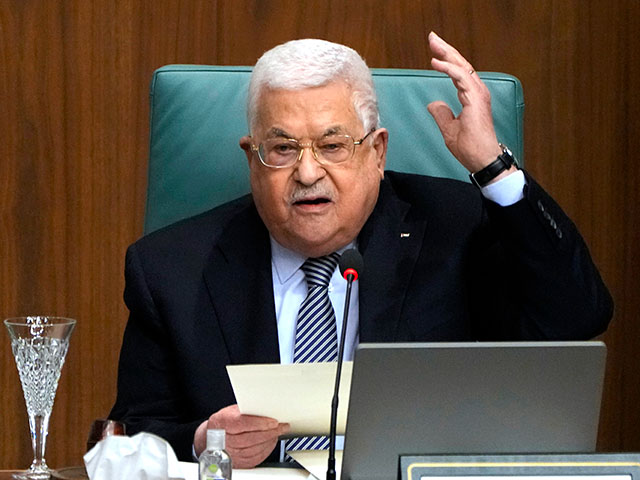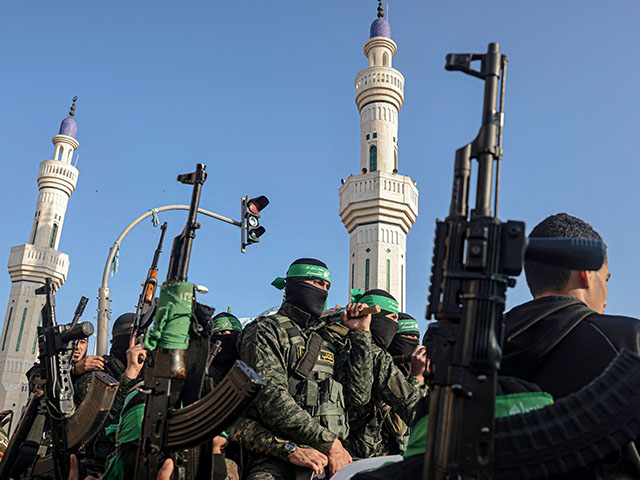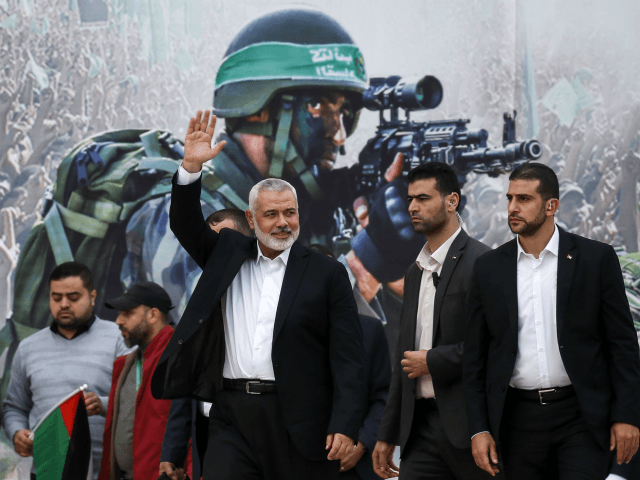Ismail Haniyeh, political leader of the Hamas terrorist group, published a pre-recorded speech on Tuesday in which he claimed Hamas is “open” to forming a unity government with the more moderate Palestinian Authority.
“We are open to all national components to rebuild our national reference under the umbrella of the Palestine Liberation Organization democratically, in addition to agreeing to a national government for the West Bank and the Gaza Strip,” said Haniyeh.

Palestinian President Mahmoud Abbas speaks during a conference to support Jerusalem at the Arab League headquarters in Cairo, Egypt, on Feb. 12, 2023. (AP Photo/Amr Nabil)
“Gaza will not see chaos or political vacuum until an agreement is reached on forming a national unity government to manage both the Gaza Strip and the West Bank,” he added.
Hamas and the Palestinian Authority (PA) have not been on the same page for about 20 years, ever since Hamas violently seized control of Gaza from the PA. The PA retains power in the West Bank.
One of the lingering questions hanging over the Gaza war has been if Hamas will remain in power in Gaza and if the Palestinians can develop a unified government. Some Israeli officials are eager to avoid occupying or administering Gaza, which has a population of about 2.2 million, while others say leaving Hamas in power would be intolerable. The latter camp doubts the PA can wrest control of Gaza from Hamas, or administer Gaza effectively even if they do.
Israeli Prime Minister Benjamin Netanyahu said in December that he would not allow the PA to take control of Gaza because it promotes and finances terrorism. Netanyahu vowed to achieve “total victory” over terrorism in response to the October 7 atrocities.

Members of the Ezzedine al-Qassam Brigades, the armed wing of the Palestinian Hamas movement, attend the funeral of their comrade Mohammed Abed during his funeral in Rafah in the southern Gaza Strip on February 16, 2022. (SAID KHATIB/AFP via Getty Images)
Netanyahu pithily vowed that he would not allow “Hamastan” to become “Fatahstan,” a reference to Fatah, the ruling party of the PA.
The far-left New York Times (NYT) noted in November that the PA is “deeply unpopular” even where it holds sway in the West Bank because it is corrupt and “seen as a subcontractor to the long Israeli occupation [sic].”
The 88-year-old leader of the PA, President Mahmoud Abbas, lost his taste for elections after Hamas rose to power in 2007 and decided to keep his own position secure by simply never holding an election again.
RELATED VIDEO — Hamas Trains Palestinian Children to Be Terrorists in Mock Tunnel:
IDFHamas assumes it will still exist and be in power after the Gaza operation ends and has been planning for the future of postwar Gaza for weeks, including a potential alliance with Fatah.
The “military wing” of Hamas is reportedly irked by these negotiations. At one point in December, military leader Yahya Sinwar reportedly demanded the political wing halt its outreach to Fatah.
Haniyeh, who is one of the senior political leaders of Hamas, apparently disregarded these demands and kept in touch with the PA. Some members of the political wing believe a fusion government with Hamas would create an entity European leaders are willing to deal with, whereas pure, undiluted Hamas is toxic and unacceptable after the atrocities committed against Israelis on October 7. A few of them seem convinced the irascible military wing will not be around for much longer and a new Hamas will emerge from the ashes.
The death of deputy Hamas leader Saleh al-Afrouri in Lebanon on Tuesday, possibly due to an Israeli drone strike, could have a significant effect on negotiations. Some observers expect surviving Hamas leaders to go deeper underground, which would curtail negotiations with both Israel and Fatah.
The terrorist group might also “harden its stance” to avoid looking “as if it is bowing under pressures of threats of more assassination,” as managing editor Ashraf Abouelhoul of Egypt’s Al-Ahram put it.

COMMENTS
Please let us know if you're having issues with commenting.